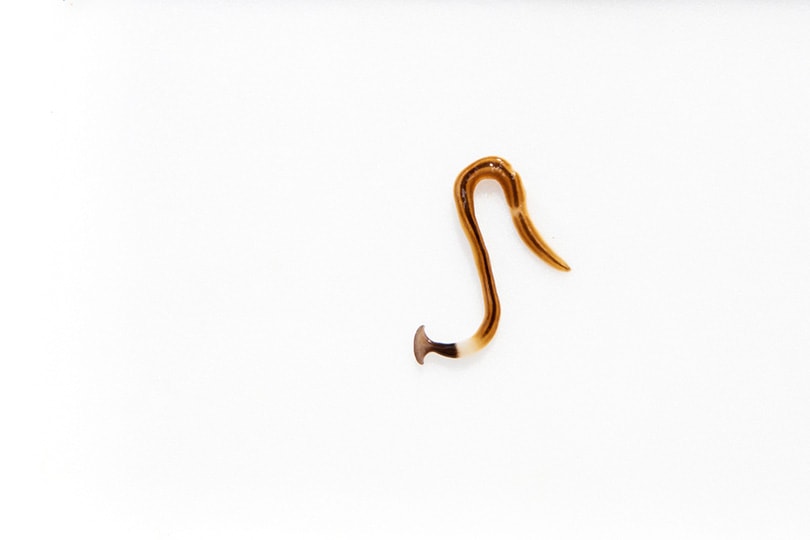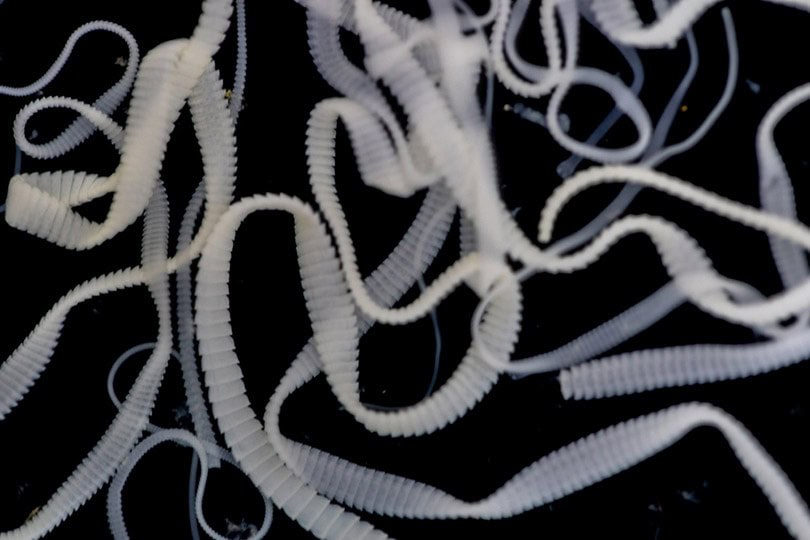VET APPROVED

The information is current and up-to-date in accordance with the latest veterinarian research.
Learn more »Click to Skip Ahead
Like humans, several diseases and medical issues can affect a cat’s health. One problem that comes from the environment and commonly affects cats is worms.
Worms are parasites, that live in a host (the cat) and benefit by obtaining nutrients from them. There are different species of worms, some of which are more common and dangerous to humans than others.
Not all types of worms that a cat has can affect humans. But certain types of worms, typically those that live in a cat’s intestines, can be passed to humans. In this article, we’ll discuss which worms commonly affect cats, which can affect humans, and what to do if you or your cat become infested.

The 3 Types of Intestinal Worms That Cats Can Get
No matter how careful and well you care for your cat, you can’t 100% prevent them from getting worms. That’s why it is vital to know which types of worms cats can get and how they might become infested in the first place. Let’s look at which types of worms are most likely to affect your cat.
1. Roundworms

Roundworms are among the most common types of intestinal worms that cats can get. They are so common that almost all cats will get them at some point in their lives. The two worms that cats can get are Toxocara cati and Toxascaris leonine. They usually infest your cat’s intestines and can cause severe illness and, in extreme cases, death, especially in kittens.
Adult roundworms are typically around 3–6 inches long and have rounded bodies. They live inside your cat’s intestines without attaching to the intestinal walls. A roundworm infestation can affect your cat’s eating habits, appearance, and growth.
Roundworms are so common in cats because of how they are transmitted. In kittens, roundworms are most often transmitted through the mother cat’s milk during nursing. Another likely cause of your cat having roundworms is when they eat something that is infested with roundworms.
Roundworm eggs can be found in soil or areas where they live, and roundworm larvae can be found inside hosts like insects, birds, and rodents. Since cats are natural-born hunters who tend to prey on birds and mice, they can get roundworms by ingesting infested prey (host).
2. Hookworms

Hookworms are other types of worms that commonly infest cats. Like roundworms, hookworms live in your cat’s intestines. However, they are only about ⅛ an inch long and are very hard to see as a result. Hookworms attach to your cat’s intestines using a mouthpart that acts as a hook. Once they are attached, they feed off the tissues that line your cat’s intestines and the blood inside the tissues.
A cat can get hookworms by eating larvae or walking across an area contaminated with hookworm larvae. When a cat grooms their feet afterward, they can ingest the larvae, which then travel through their digestive tract and into the intestines. Once inside the intestines, it takes between 2 and 3 weeks for a hookworm to grow and mature fully, so you may not even know that your cat has been infested for several weeks.
3. Tapeworms

Tapeworms attach to the wall of your cat’s intestine and feed off it. They are flat, long worms growing up to 11 inches long. They have segments that can be passed in your cat’s feces, which resemble a grain of rice in color, size, and shape. Due to their size, it will be noticeable if your cat is infested with tapeworms.
The part of a tapeworm that usually passes in a cat’s feces is the part that contains the eggs. It will eventually break open as it dries out, releasing the eggs into the environment. If you live in a multi-cat household, this can cause your other cats to become infested, too, particularly if they have fleas.
Flea larvae usually consume tapeworm eggs, at which point the egg grows into a tapeworm larva inside the flea. If a flea gets on your cat, your cat could ingest it while grooming or biting at itchy skin. Your cat needs to eat the flea to get infested with the tapeworm because the flea has to act as a host first.

What Types of Worms Can Cats Pass to Humans?
Although several types of worms can affect cats, only some can be transmitted to humans. Diseases that can be transmitted from animals to humans are called zoonotic diseases. However, you don’t have to worry about getting heartworms or lungworms from your cat.
Humans are more likely to encounter worms if they handle their cats’ feces. Since they are responsible for cleaning the litter box and cats rest on sofas or beds, they are more likely to come into contact with them. However, not all intestinal worms pose the same risk to humans.
Roundworms and hookworms are the most common types of worms humans can get from cats, but the methods of transmission for the two are different. For example, roundworms usually have to be ingested. Of course, this would be accidental ingestion, but it usually happens when a cat owner doesn’t wash their hands after cleaning the litter box or comes into contact with contaminated soil or water.
Although hookworms primarily affect the intestines of cats, they can also affect human skin. They do this by penetrating your skin when you’re cleaning a contaminated litter box or walking barefoot on contaminated soil. The tiny larvae can burrow into human skin and cause a disease called cutaneous larva migrants, or “ground itch.”
One type of intestinal parasite that you don’t get directly from your cat is tapeworms. To become infested with tapeworms, you have to eat the vector (flea), not the eggs. Fortunately, this is not very common.


Can Humans Get Worms From Fleas?
Theoretically, humans can get worms from fleas, but the chances are low. It’s important to remember that the only type of worm that fleas typically carry is tapeworms. Since tapeworms usually have to be ingested in order to be transmitted, you won’t get them just by being bitten by a flea on your cat. You’d have to ingest a flea that was carrying a tapeworm in order to get infested since that is how the life cycle of the parasite is completed.
What Are Signs of Worms in Humans?
If you were to get worms from your cat, you might not even notice. You wouldn’t start showing signs until the worms became fully mature, and sometimes, depending on the severity of the infestation, you may not have signs at all.
But if you experience signs, they are similar to those that your cat may experience. Signs of intestinal worms in both cats and humans include:
- Abdominal pain
- Blood in feces
- Diarrhea
- Fatigue
- Gas and bloating
- Nausea and vomiting
- Weight loss or inability to gain weight

How Are Worms in Humans Treated?
If you are experiencing several of the signs listed above, you need to seek advice from your doctor. If you are diagnosed with intestinal worms, you’ll likely be given an antiparasitic medication that will kill the worms.
The exact type of medication you’re given will depend on the type of worm you have and the severity of the infestation. When taking the proper medication, the worms will usually be gone within a few weeks.
How Can You Protect Your Cat and Yourself From Getting Worms?
The best way to protect yourself from getting worms from your cat is to protect your cat from getting worms in the first place. Regularly deworming your cat is vital to kill the parasites that your cat may have. It’s important to understand that this medication does not prevent your cat from getting worms. Keeping your cat indoors can prevent them from coming into contact with disease-carrying insects and animals. If fleas are a problem, give your cat flea medication to kill them and prevent your cat from becoming infested.
If you do notice that your cat has worms, it’s essential to take them to a veterinarian so they can get started on a dewormer medication. Finally, wear gloves and make sure you are washing your hands immediately after changing your cat’s litter to prevent any potential worm infestation from happening.


Final Thoughts
Although it isn’t incredibly common, there are certain types of worms that a human can get from a cat, including roundworms and hookworms. If you suspect that you or your cat has worms, it’s important to seek medical treatment immediately. Taking preventative measures ahead of time can minimize the risk that you or your cat gets infested with worms.
You may also want to read:
Featured Image Credit: New Africa, Shutterstock











